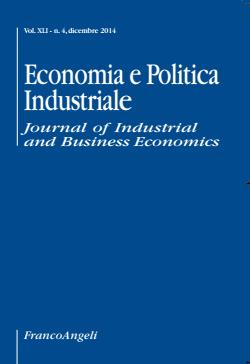
BOOKS BY GIANCARLO CORÒ
The search has found 57 titles





Aim of this article is to analyse virtuous relationships between cultural activity and economic growth, particularly at urban level. Recognising that by too much time concepts of culture and economics have belonged to far worlds of meanings, we estimate worthwhile to recall several reasons to look today at cultural policies among the most important strategies for local development in the global economy. Using up-to-date statistical data on cultural economics, the article shows relevance of culture activities and employment in the modern economies. The operational concept of cultural district has recovered from industrial economics, but it’s used in new meanings and institutional perspectives to design a wide integrated strategy of local development. After a review of economic literature considering cultural districts as important concept to understand economic change and growth, this article analysed various experience of cultural strategies at urban level in United States, Europe and Italy. Final remarks underline bearing of cultural strategies in the evolution of Italian economy, not just to shift from manufacture toward tourism-cultural specializations, but also to feed local industrial innovation processes with creative resources.

Aim of this paper is to analyse by a review of economic literature several relationships link economic competitively and social cohesion. Paper tries to overcome the ideological opposition between the two concepts, recognizing that an appropriate mix of both represents a classical issue in development theory. For instance, the paper examines two different ways where is possible to look at the competitively and cohesion interactions. The first is to deal economic growth with divergence processes: allowing for neo-classical models and new economic geography approach, analysis seeks to understand if European integration process is increasing or reducing regional disequilibria. The second is to face innovation processes and social capital endowment: using a political economy approach, the review shows how in high developed economies rational oppositions to innovation often take place, especially when innovation arrives through new technologies, new firms, and new jobs. Final remarks in both perspectives point to enhance social awareness for a better governance of innovation and economic growth, especially at local level.

Politiche, infrastrutture, concorrenza
cod. 380.316


Since 2001 Italian economy is on trouble. The main stream explanations pick out primary causes on industrial specialization (based on traditional sectors) and related size structure (strong weight of small firms): this conditions should expose economy to low costs competitors and grows to be difficult technological innovation processes investments. This article advances a different insight in so called industrial decline of Italy and it tries to outline several growth trajectories based on a realistic political economy perspective. First of all, the paper propose a reading of institutional cycles as key to an understanding this critical economic passage, that is shared with other advanced economies, specifically in Europe. On the other hand, it discuss four innovation economic strategies for Made in Italy industries: experience goods and services, technological integration processes, information goods disjointing from industrial operations, and multinational organization of production. Conclusions try to discuss the schumpeterian problem of social opposition to innovation as one of the main barrier to growth that economic institutions have to face in high developed countries.


La Vallesina delle imprese e delle comunità locali
cod. 380.244


This paper analyses how new tools of regional political economy may increase effectiveness learning from the governance experience rooted in several industrial districts. The first step to do it, is try to change traditional perspective in which the concept of industrial district has bounded. To generalise the theoretical framework of industrial district we need, over all, to recognize the function of territory in social, cognitive and institutional building of economic development. Analysing imple-mentation processes of the Italian industrial district law, the paper points out some questions about growth and innovation policies of small firms systems, i.e.: operative definition of local level in industrial policy; choice between leading industry and a wider cluster of activities; different institutional capabilities and paths to embody a collective strategy of local development; how contestable markets, joint action and economic evaluation may come into regional political economy.

cod. 380.209





